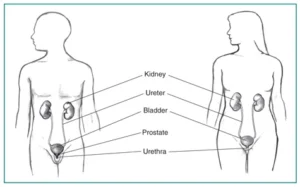
scopeblog.stanford.edu
What is Urinary Tract Infection
Urinary Tract Infection is an infection that can occur in any part of the urinary tract. The urinary tract is made up of the Kidneys, ureters, urinary bladder and urethra. Most infection occurs in the lower urinary tract- The bladder and urethra. Women can get more UTI infections than men. Usually, bacteria are responsible for urinary tract infection, but sometimes fungi and viral are also.
What is Urinary Tract & How Does It Work
The urinary tract includes the following parts:

urologysanantonio.com
- Kidneys: Kidneys are the small organ of the human body and are located at the back of the body. They work as a filter and removes waste and water from our body. This by-product is known as urine.
- Ureters: The ureters are the thin tubes that carry urine from the kidney to the bladder.
- Bladder: It is a sac-like container. The bladder stores urine until it removes from the body.
- Urethra: The urethra helps to remove urine from the bladder to the outside of the body.
Types Of Urinary Tract Infection
There are two categories of UTIs:
Uncomplicated :
Acute Pyelonephritis: In acute pyelonephritis, bacteria affect the kidneys and common symptoms of cute pyelonephritis are: Back pain or side pain, high fever, shaking and chill, Nausea and vomiting.
Cystitis: In Cystitis bladder gets infected. Pelvic pressure, Lower abdomen discomfort, Frequent painful urination, and blood in the urine are the symptoms of Cystitis.
Complicated:
Complicated UTIs include men, pregnant women, after obstruction hydronephrosis, renal stones or renal fistulas, immunocompromised patients or the elderly, after an instrument used by an atypical organism or if using a medical device such as a urinary catheter that occurs in combination, the patient undergoing a kidney transplant, patients with dysfunctional kidney, or after prostatectomy or radiation therapy.
Causes:
The urethra that removes urine from the bladder to outside the body is close to the anus. Bacteria from the large intestine, such as E.Coli can invade the urethra through the anus. From the urethra, they move up to the bladder and if the infection is not treated properly it may increase and spread up to the kidneys. The most common urinary tract infection occurs in women in comparison to men due to shorter urethra than men. It makes an easy way to get bacteria into their bladder.
Most commonly infection is found in the bladder but can spread to the kidney. Women are more likely to get a urinary tract infection while having sex or after the birth of a baby as use a diaphragm for birth control. Menopause also increases the chance of UTIs in women.
The following factors are responsible for to increase in UTIs:
- Diabetes
- Advanced age and condition that affects personal care habits (such as Alzheimer’s disease and delirium).
- Having urinary catheter
- Bowel incontinence
- Enlarge prostate, narrowed urethra.
- Kidney stone
- Pregnancy
- Hip fracture (immobile for a long period of time)
- Surgery or other procedure
Symptoms Of The Urinary Tract Infection
The lining of the urinary tract becomes red in the urinary tract infection, and irritated (inflammation), which may produce these symptoms:
- Polyuria –When the body makes a lot of urine and it makes lots of pee.
- Incontinence- The loss of bladder control, is an embarrassing problem.
- Hesitancy- Urinary hesitancy affects people of all ages and occurs in both sexes.
- Suprapubic Pain- Superapubic pain occurs in the lower abdomen near the hips, intestine, bladder and genital disorder.
- Sepsis- A serious illness resulting from the presence of harmful microorganisms in the blood.
- Rigors- A sudden feeling of cold with shivering.
- Tachycardia- It is a condition that makes a heartbeat over 100 times per minute.
- Loin-to-groin pain- A very classical description of pain caused by a kidney or ureter stone.
- Fever or Chills
Prevention:
- Drink Plenty of Water: It helps to dilute the urine and flush out bacteria from the body before an infection can occur.
- Drink Cranberry Juice: It prevents UTIs.
- Wipe from front to back: Do after urinating and after a bowel movement. It helps to prevent bacteria.
- Empty your bladder after intercourse.
- Avoid using feminine products.
Disclaimer: All the content of this article is for information purposes only.
References:

 Myocardial Infarction- Symptoms, Causes & Treatment
Myocardial Infarction- Symptoms, Causes & Treatment Malaria: Causes, Symptoms & Diagnosis
Malaria: Causes, Symptoms & Diagnosis Prostate Cancer: Causes, Symptoms & Treatment
Prostate Cancer: Causes, Symptoms & Treatment Heart Attack: Symptoms & Risk Factors
Heart Attack: Symptoms & Risk Factors


